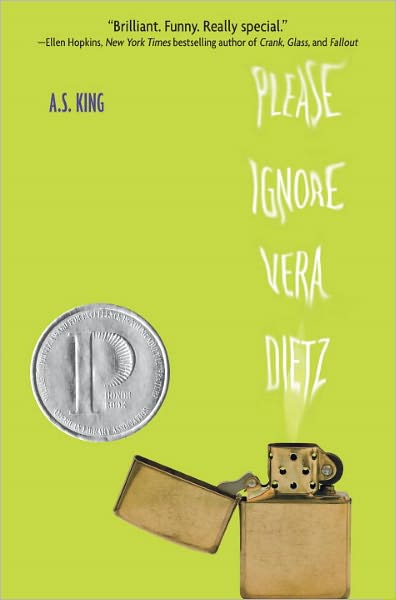.
King, A.S. Please Ignore Vera Dietz. New York: Knopf, 2010. 326p.
Audience: High School, 14+
Genre: Problem Fiction
Topics of Focus: Friendship, Adolescence, Abuse, Grief, Resiliency, Forgiveness
King presents a relatively entertaining text for an average teen reader. There is nothing significantly unusual or spectacular about the story. It’s just a good read. Using the trendy shifting narration style, King allows the reader to unravel a mystery facing the main character, Vera Dietz:What really happened to her best friend Charlie Kahn and did he burn down the pet store, hurting numerous animals? Charlie has always been Vera’s best friend. They’ve shared childhood curiosity, secrets light and dark, and even the beginnings of innocent love. Yet, when adolescence moves in with force, so too does adolescent angst, doubt, jealousy, and secrets too dark to discuss. Add in Vera’s ex-stripper mother who skipped out on the family leaving V’s father broken-hearted and bitter. Blend in perceived class differences between Vera and Charlie’s families and the known reality of domestic abuse in the Kahn household. Drop in a pinch of Vera’s lonely, alcoholic father who believes that being a workaholic is the key to overcoming all of one’s problems. Fold in a set of nasty, jealous, and drifting teens who abuse others to feel better about their own lives. Place it all in a common, small-town setting and let it simmer in the mind of the main character. The final result, however, is not fully satisfying. It’s good, but not great. There are too many side stories undercooked. The ending is predictable. And, the narrative voices of the dead Charlie and the pagoda just skew the integrity of the story. Though, I have to admit that I really loved the flavor of the dad’s flowcharts. They added a needed lightness to the overall effect of the novel.
I believe that teens would pick it up and read it on their own. They would not need support or discussion from an adult to work out the underlying intent of the story. They might be intrigued by the characters and the unfolding mystery surrounding Charlie’s death. Yet, this book isn’t one that I will recommend over and over again, nor does it hold significant purpose for use as a classroom text. It’s just a plain good read.
Annotation by Denise Aulik

No comments:
Post a Comment